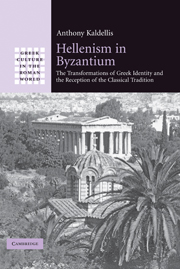 Hellenism in Byzantium
Hellenism in Byzantium Published online by Cambridge University Press: 24 December 2009
Defining Europe and “the West” more generally has become a difficult and contentious project, as political as it is theoretical and as pressing as it is unlikely to result in a broad consensus. Now that boundaries are being tested and former certainties are becoming obsolete in both theory and practice, to define anything at this level of abstraction, with so much at stake for so many, is to enter a debate where theory is immediately translated into politics (or vice versa). For example, one recent trend of thought looks to the Roman tradition as the basis of European identity, but given how it understands “Rome” this position inevitably reflects a Latin bias. Are the Slavic, Germanic, and Greek traditions and contributions – to name only a few – so marginal? In a more sophisticated version, the Roman basis is perceived as fundamentally engaged with the Greek and Hebrew pasts and so both defined by them and in a self-conscious, secondary relation to them. Yet this ignores the degree to which ancient Hellenism and Judaism were themselves also defined through constructed oppositions, and it also tends to conflate “Roman” with “Latin” and even “Catholic,” choices that, as we will see, are anything but ideologically neutral. Others insist that Christendom is the true crucible of the modern West. But this too imposes discomforting exclusions, and challenges the secular enterprise of modernity.
To save this book to your Kindle, first ensure no-reply@cambridge.org is added to your Approved Personal Document E-mail List under your Personal Document Settings on the Manage Your Content and Devices page of your Amazon account. Then enter the ‘name’ part of your Kindle email address below. Find out more about saving to your Kindle.
Note you can select to save to either the @free.kindle.com or @kindle.com variations. ‘@free.kindle.com’ emails are free but can only be saved to your device when it is connected to wi-fi. ‘@kindle.com’ emails can be delivered even when you are not connected to wi-fi, but note that service fees apply.
Find out more about the Kindle Personal Document Service.
To save content items to your account, please confirm that you agree to abide by our usage policies. If this is the first time you use this feature, you will be asked to authorise Cambridge Core to connect with your account. Find out more about saving content to Dropbox.
To save content items to your account, please confirm that you agree to abide by our usage policies. If this is the first time you use this feature, you will be asked to authorise Cambridge Core to connect with your account. Find out more about saving content to Google Drive.